2020 Book challenge: 24 books
Update on 20th May: 18/24
Hey, thanks for checking out my blog. This post is from my book reflection series where I try to capture the why and most interesting things about the books I read (Click here for Jan-Feb book review). My goal was to read 24 books in 2020, but I’m surpassing my expectations and my current reading speed is 4 books a month.
It can be hard to retain information when reading a lot. My choice of genre varies, and sometimes I forget why I picked up a certain book and what I learned. So, to keep track of it, I decided to write my reflections here.
Note: This is not a review of the books, but rather an attempt to outline my most memorable parts and favorite quotes from them. If you’re looking for recommendations and not sure what to read next, the below will be useful without spoiling too much.
So, without further ado, here are the 8 books from March & April in the order I read them.
Click on the book names to find it on Goodreads.
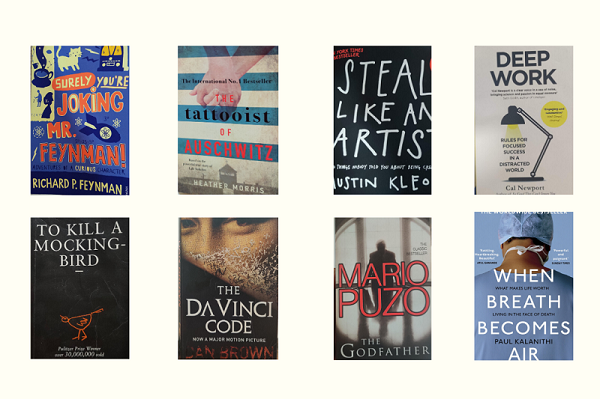
Surely You’re Joking, Mr. Feynman!: Adventures of a Curious Character by Richard P. Feynman
Why?
I love biographies and I was fascinated by Richard Feynman after watching this video. While researching about learning techniques, many blogs also spoke about the Feynman Technique. That’s what inspired me to read more about Feynman. I usually read entrepreneurial biographies and memoirs, so I thought reading about a physicist might be a good change.
What to expect?
Prepare to be mesmerized. Richard Feynman is no regular guy. Well, of course, he is a Nobel Prize winner in physics, but the simplicity with which he viewed the world and followed his many passions got me buzzing with excitement.
From repairing electronics in his hometown at the age of 11 to picking safes guarding nuclear secrets. Chatting with Einstein to playing bongo drums at the carnival in Brazil and acting on his whim to draw and selling commissioned portraits later on.
This is not exactly a biography. rather a record of conversations between Richard and his friend. Thus, it does not follow a straight storyline.
Favorite quote
“You have no responsibility to live up to what other people think you ought to accomplish. I have no responsibility to be like they expect me to be. It’s their mistake, not my failing.
Richard P. Feynman

The Tattooist of Auschwitz by Heather Moriss
Why?
Two friends recommended this book on the same day. And by chance I found myself strolling through Blossom book house in Bangalore and saw this, so I picked it up. I had also read Man’s Search for Meaning last year and wanted to read more books based in Auschwitz.
What to expect?
Life is Auschwitz. Love in Auschwitz. It’s brutal at times, describling the fate of millions in the detention camp, but equally loving, describing how love brew between the Tattoist (Lale) and Gita.
Lale, the protagonist witnesses horrific atrocities, but through his bravery and good luck survives the camp, finds love, helps fellow prisoners, and breaks free eventually to marry Gita.
It’s very easy to read. You get lost in Lale’s world, imaging daily life in one of the harshest places in the world ever.
Favorite quote
“If you wake up in the morning, it is a good day.”
Heather Morris
Deep Work: Rules for Focused Success in a Distracted Work by Cal Newport
Why?
I bought this in June 2019 when I was living in Melbourne. I started reading this before a 5 week holiday and almost halfway through, I realized that as the title suggests, this book also requires focused attention and to get the best out of it, to apply the principles set out in your own life. I knew that ain’t gonna happen while I’m backpacking so I stopped. Given the lockdown in India, I picked it up again and gained great tips on working with focus.
What to expect?
“In this new economy, three groups will have a particular advantage: those who can work well and creatively with intelligent machines, those who are the best at what they do, and those with access to capital.”
Cal Newport changed my perspective about so many things through this book. The first half talks about why deep work is rare and meaningful, the second part outlining rules to apply in your life. Deep work is the ability to focus without distraction on a cognitively demanding task. It’s a skill that allows you to quickly master complicated information and produce better results in less time.
I’m not going to detail the strategies, but here are the topics I related most:
-Deciding on a deep work philosophy
-Deploying rituals
-Dont work alone
-Execute like a business
-Embrace boredom
-Schedule in advance when you’ll use the internet
-Meditate productively
-Quitting social media
-Scheduling every minute of our day
-Decide your shutdown time…
Favorite quotes
“If you can’t learn, you can’t thrive.” “Two Core Abilities for Thriving in the New Economy 1. The ability to quickly master hard things. 2. The ability to produce at an elite level, in terms of both quality and speed.”
Cal Newport
Steal Like an Artist by Austin Kleon
Why?
I picked up “Show Your Work” by Austin Kleon in an op-shop for $1 in Melbourne. It was a fun, short read, and packed with great insights. Later I found out about Steal Like an Artist and gifted it to a friend in India. I was hungry for more books this year, so I asked her to post it back to me lol. Very stealthily, I stole this book from here.
What to expect?
If you struggle with ideas and sharing your work, this is a great book. It’s packed with insights, personal stories of the author, and quotes to stir up your creative mind and find inspiration where you can steal from.
It’s a very small book, you can probably finish in an hour or two. Some snippets below:
Favorite quote
“Not everybody will get it. People will misinterpret you and what you do. They might even call you names. So get comfortable with being misunderstood, disparaged, or ignored — the trick is to be too busy doing your work to care.”
Austin Kleon
When Breathe Becomes Air by Paul Kalanithi
Why?
And I return to my favorite genre; biography and memoirs. A close friend recommended this first, and then another mentor raved about it in his newsletter. I knew I had to get it, so I used my last remaining credit on Audible to purchase this.
What to expect?
This book is beautiful. And sad. It’s about life and death. At 36 years old, Paul Kalanithi, a neurosurgeon gets diagnosed with Stage IV lung cancer. One day he was a doctor treating the dying, and the next he was a patient struggling to live. What follows is a riveting account of his experience dealing with the news. His thoughts on success, death, and meaning in life.
I cried more than a few times listening to this book. It’s very moving. Paul shares about his life before the diagnosis and how facing death changes his perception on life and his relationships with his wife.
Favorite quote
“The tricky part of illness is that, as you go through it, your values are constantly changing. You try to figure out what matters to you, and then you keep figuring it out. It felt like someone had taken away my credit card and I was having to learn how to budget. You may decide you want to spend your time working as a neurosurgeon, but two months later, you may feel differently. Two months after that, you may want to learn to play the saxophone or devote yourself to the church. Death may be a one-time event, but living with a terminal illness is a process.”
Paul Kalanithi
To Kill a Mockingbird by Harper Lee
Why?
Ok, so now I am in the second week of lockdown in Kota and I didn’t stock up on books. I had thought of visiting a book store before flying out of Bangalore, but I didn’t think there would be a month-long lockdown.
So I started scouting for my sister’s old stash of books and found this gem. When I first finished this novel in 2015, I did not fully grasp it. I was expecting a really thought-provoking book with important messages. I did get that but there was also boredom, slowness, dryness, and confusion.
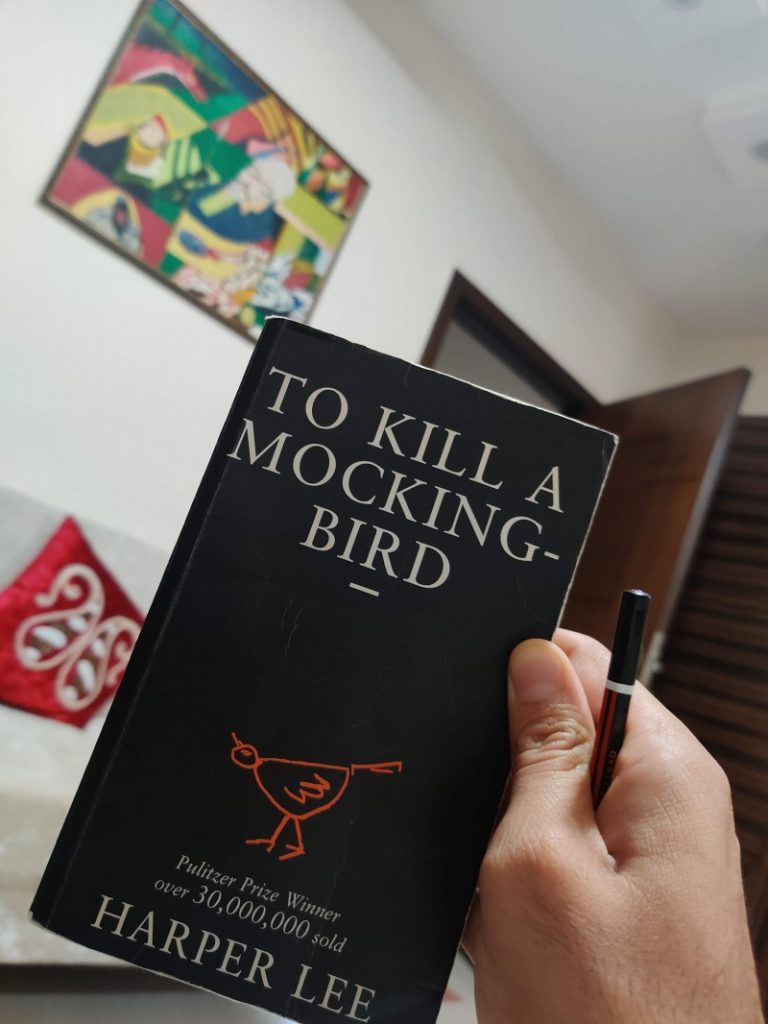
I picked it up again last month and realized the problem. Back then, reading was a burden. I read to tick books off my list, I did not enjoy reading but felt it’s something I need to learn to do. I decided to give it another go, to fall back into Scout’s world, and pretend to be eight and let life simply be.
What to expect?
Through the uncorrupted eyes of a child, Harper Lee shows us the beautiful complexity of our common humanity and the importance of striving for justice in our own lives & our communities.
To Kill A Mockingbird is one of those rare books that doesn’t give in to the belief that ”deep down, everybody’s actually good.” Not everybody is. And we must still persevere to see things from their perspective, and though we may not justify their ways, we must strive to understand them – though we might not follow them, we must try to be as kind to them as possible. And yet, there comes a time when some people need to be put down – we must follow the call of our conscience then, and yet be kind to them in the process, as much as we can.
The book follows the journey of two kids, Scout and Jem, growing up in the 1930s; life from their point of view as they see their father defend a black man accused of the rape of a white girl.
Favorite quote
“You never really understand a person until you consider things from his point of view… Until you climb inside of his skin and walk around in it.”
Harper Lee
The Da Vinci Code by Dan Brown & The Godfather by Mario Puzo
I combined the last two books because my reasons for reading it and expectations are quite similar.
Why?
Just because I didn’t have anything else to read and these were the only exciting ones in my sister’s collection at home. I’m not a big fan of e-books and listening on audible can take a toll if you’re at home all day. It’s a different feeling, reading a physical book.
My small Instagram family recommended The Da Vinci Code, so I started with that. And The Godfather also has amazing reviews on the net, so I had to read to it.
I’m generally not too fond of fiction, but these two books changed that for me.
What to expect?
A lot of suspense. These are both very popular books and also major motion pictures. I’m sure you have heard from them so I’m not going to outline the plot here.
Both are about 600 pages long, but the Da Vinci Code takes place over just one night in Paris & London while The Godfather takes place over a number of years, but both are equally gripping reads.
In Da Vinci, you’ll learn a lot about the rise of modern Christianity, but I’m not sure how much of that is factual. In the Godfather, you learn about the Italian mafia’s in the US, lots of drama, suspense, and murder.
Favorite quote
“History is always written by the winners. When two cultures clash, the loser is obliterated, and the winner writes the history books-books which glorify their own cause and disparage the conquered foe. As Napoleon once said, ‘What is history, but a fable agreed upon?”
Dan Brown, The Da Vinci Code
“He smelled the garden, the yellow shield of light smote his eyes, and he whispered, “Life is so beautiful.”…..Yes, he thought, if I can die saying, “Life is so beautiful,” then nothing else is important.”
Mario Puzo, The Godfather
That’s about it. I hope you enjoyed this post, especially if you made it this far. Have you read any of the books above? I’d love to hear your thoughts on them.
See you with the next book reflection in July ~ Happy Reading!
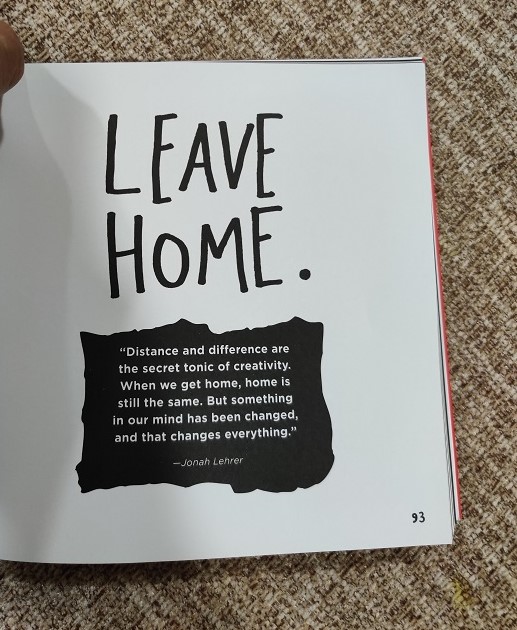
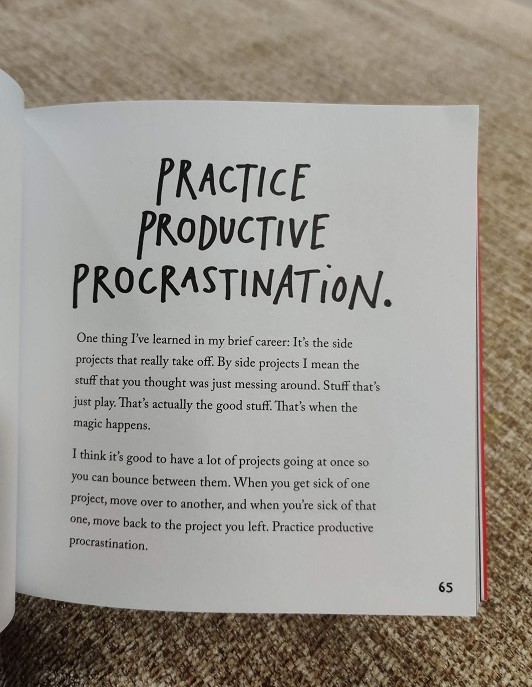
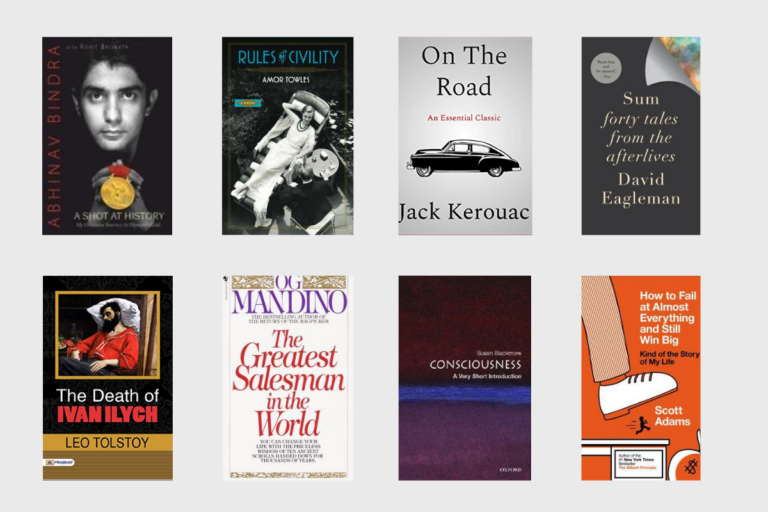


Pingback: Book Reflections: May & June 2020 - Ayush Jain
Pingback: Book Reflections: July & August 2020 - Ayush Jain